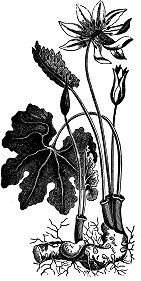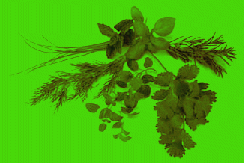Herbal Companion Planting in the Vegetable Garden
by Darlene S. Widirstky
Have you ever noticed how some plants do better when they are in the company of others? This is the basis of companion planting, and it is a practice used to achieve healthier plants. If you know which plants to use you can increase plant performance and attract beneficial insects while repelling harmful ones. The practice of planting the appropriate companions can eliminate the use of harmful chemical insecticides for the average home gardener.
the appropriate companions can eliminate the use of harmful chemical insecticides for the average home gardener.
Herbal companion planting is a technique used mostly in the vegetable garden. Combining herbs with your vegetables not only enhances and protects the vegetables, but the herbs you might want to use in preparing your vegetables are conveniently placed for harvest as needed.
The following are examples of herbal companion planting in your vegetable garden.
Basil planted among tomato plants actually does enhance the taste of ripening tomatoes, in addition to protecting them from disease and insects. Basil's aroma repels flies and mosquitoes, so place some potted basil on your outside decks and by house entrances; and you will also be protected.
Borage is another herb that is a useful herb companion plant for tomatoes. Borage helps deter tomato worms. In addition to basil and borage, garlic is another companion for tomatoes. Like chives, they repel aphids; they also control cutworms and hornworms.
Summer savory is a great companion plant for onions and garlic. Planting summer savory with beans enhances their flavor, and protects them from bean beetles. Planting oregano with beans also enhances their growth.
Plant horseradish near potatoes to deter potato bugs and for more disease-resistant potato tubers. Thyme, when planted near cabbage, helps deter cabbageworms and whitefly. Thyme attracts bees to tomatoes, potatoes, and eggplant. The bees do the pollinating and you get more fresh produce.
In addition to thyme, there are several other herbs that are good herb companions for cabbage. Peppermint, rosemary, and sage attract beneficial insects. Plant some hyssop, marigolds, and dill near cabbage and they will lure cabbage butterflies away from the cabbage.
Planting the appropriate herbs can protect your plants. Here are some general gardening tips:
- Chives help prevent mildew, deter green flies, and repel aphids. Planting clumps of chives under your roses will save you a lot of time working in your rose garden.
- Calendula, nasturtium, poppies, and marigolds (Tagetes patula and T. erecta) all attract hoverflies into the garden. Hoverflies are beneficial insects; their larvae feed on aphids.
- Garden sage and mints also deter a variety of pests while attracting beneficial insects.
- Chamomile is a tonic to any ailing plant it's near in your gardens; and if you have any ailing house plants, give them an occasional "drink" of watered-down chamomile tea.
- Catnip is good for controlling flea beetles. If you think these insects might be a problem in your garden, use catnip as a border plant around your gardens.
- Marigolds (Tagetes patula and T. erecta) produce a root secretion that destroys root-eating nematodes. These microscopic worms can devastate entire trees as well as strawberry crops.

- If you know or suspect that nematodes are the cause of your gardening woes, plant a crop of marigolds instead of your usual crop. In the fall, plow them into the soil and the following spring replant your crop. This method usually works for up to three years. By the way, the secretions of marigold roots also kill two common weeds; i.e., ground elder and birdweed. Therefore, whether you plant a field of marigolds or a few here and there, you will be helping your soil and your plants.
All of the above herbs can be grown in your ornamental gardens for insect control.
For those gardeners out there who do not appreciate the eclectic look, I'll mention a few herbs that can be made into teas and used as organic insecticides. The general rule is to gather 1 cup of fresh leaves, simmer the leaves in four cups of boiling water for one hour, strain, cool, and then add about 1 tablespoon of dishwashing detergent. Pour the mixture into a spray bottle and use as needed.
The herbs to use are as follows:
- Costmary is a very good general insecticide.
- Great fleabane is another general insecticide; but it is very strong, so use it sparingly.
The leaves of several herbs can be used to control aphids; i.e., elder, rhubarb, basil, garlic, and wormwood. In addition to protecting against aphids, wormwood leaf tea will also control caterpillars, moths, and flea beetles.
Gardening satisfies many of our needs. Using herbal companion planting, as well as other methods of organic gardening, we will not only be eating healthier vegetables, but we can also pass on a healthier legacy for the future of our children and our planet.
Visit the Horticulture Page here
The author is a Master Gardener and editor of the SCMGS Newsletter (Long Island, N.Y.).